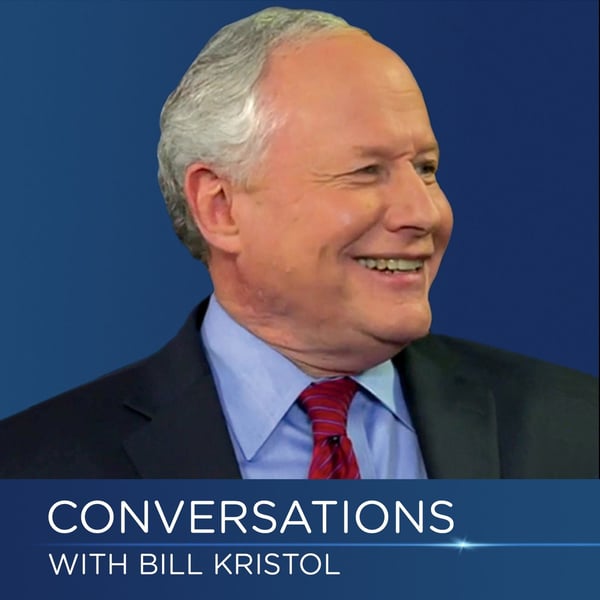Ryan Goodman: Does Donald Trump Really Face Legal—and Political—Jeopardy?
Conversations with Bill Kristol
Conversations with Bill Kristol
4.7 • 1.7K Ratings
🗓️ 15 June 2023
⏱️ 67 minutes
🧾️ Download transcript
Summary
Transcript
Click on a timestamp to play from that location
| 0:00.0 | Hi, I'm Bill Crystal. Welcome back to conversations. I'm very pleased to be joined today by Ryan Goodman, a professor of law at NYU before that at Harvard Law School, served in the Defense Department, a special counsel to the general counsel of the defense department. |
| 0:29.0 | The defense department, which is a big enterprise and a big job in the later Obama administration. So executive branch experience as well as a huge familiarity with a national security law as a professor as a practitioner and Ryan's written a lot of people have undoubtedly seen it and been on TV commenting on the many national security legal issues that have arisen in the in the Trump years. I highly recommend the website. He's co editor of just security.com. |
| 0:59.0 | Org, which also has the January six clearinghouse really all the documents you need to understand all the different issues raised by January six another case that's coming up. I suppose we'll talk about that reasonably soon. But anyway, we're speaking on what is it Wednesday June 14th, the day after Donald Trump was arraigned in Miami, Florida on the classified documents case. So Ryan, thanks, thanks very much for joining me. |
| 1:24.0 | Thanks so much for looking forward to the conversation. Yeah, no, I am too. So let's get right into it on the documents. I mean, I guess. |
| 1:31.0 | Maybe say a word you were in the defense department and Jesus has been an area you studied for a long time, specialized in. |
| 1:38.0 | We will talk a little bit about the legal, the importance of the case. I mean, apart from the, you might have broken some laws. Some people say, but come on house. You know, he's careless. He's a bit of a narcissist. He likes that momentos. |
| 1:50.0 | But are we really making a federal case, so to speak out of that. So say, say, say a bit about that. |
| 1:56.0 | Yeah, so thanks. |
| 1:59.0 | So I guess the way in which I start to think about the case is the subject of these documents that they are the most highly guarded US secrets based on the classification markings. |
| 2:16.0 | So this is many a top secret document. They're in the indictment itself at lists 21 top secret documents. |
| 2:24.0 | Some of them are not even just top secret, the top secret plus plus because they're compartment at information that are code word programs that are so highly protected that even the code words are redacted in the indictment. |
| 2:38.0 | Right. |
| 2:40.0 | And so it's the seems like those are kind of the crown jewels and some of them. |
| 2:46.0 | And it's about US nuclear capacities, military capacities, vulnerabilities of the US from a foreign attack vulnerability of other countries from attack. |
| 2:56.0 | Time and again, each each one of the documents gives you at least a title and seems to be about those kinds of matters. |
| 3:03.0 | So we're not talking about concerns about over classification, anything like it. |
| 3:07.0 | The one way I guess I would underscore the significance of the case here is, yes, it's true that if |
| 3:17.0 | the former president Trump disseminated the information to others, that would is really what the rules are about in a certain sense, the laws about to try to prevent that. |
| 3:25.0 | And that's why there would be a former true espionage in the way in which we think about it. |
| 3:29.0 | But the other is that the rules are set up to be so strong in the protections and criminally enforced because if people take them out of highly secured environments, then they are considered compromised. |
| 3:44.0 | So I have to imagine the intelligence community, whenever they saw those photographs for the first time and understood that these boxes were being located in a ballroom stage with open access in Mar-a-Laga, for example, they would have to say we work, we must work with the presumption that the content of those documents have been compromised. |
| 4:07.0 | And then they have to go into all these remediation steps and that could easily mean that they have to abandon certain intelligence programs surveillance programs, human sources and contacts. |
... |
Please login to see the full transcript.
Disclaimer: The podcast and artwork embedded on this page are from Conversations with Bill Kristol, and are the property of its owner and not affiliated with or endorsed by Tapesearch.
Generated transcripts are the property of Conversations with Bill Kristol and are distributed freely under the Fair Use doctrine. Transcripts generated by Tapesearch are not guaranteed to be accurate.
Copyright © Tapesearch 2025.

